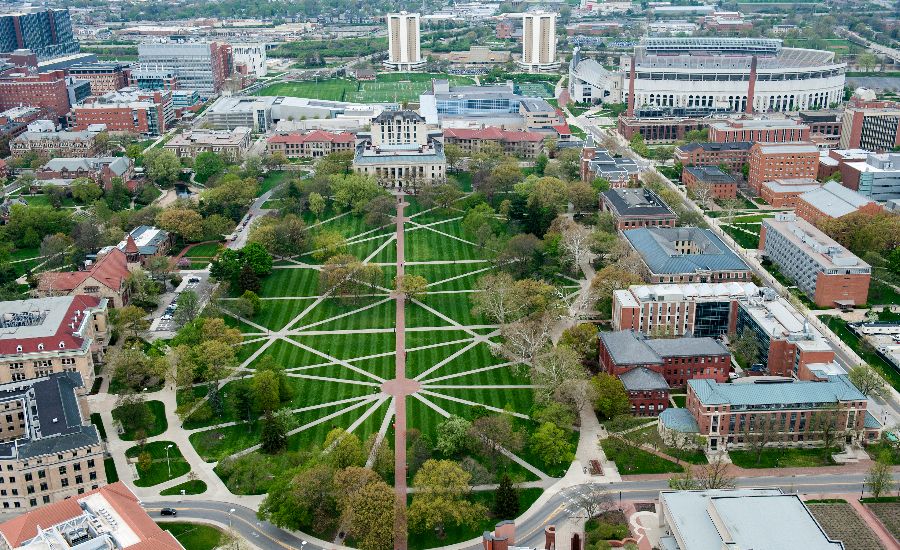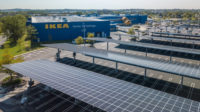The U.S. Dept. of Energy is funding $61 million toward 10 “smart building” pilot programs across the nation aimed at increasing energy efficiency and cutting energy use during times of peak demand.
More than 7,000 homes, workplaces and other structures will be converted into grid-interactive efficient buildings, known as GEBs, with smart controls and sensors that communicate with the electrical grid as part of the Connected Communities program, DOE announced on Oct. 13. The program will target the building sector’s carbon emissions as part of the Biden administration's effort announced in May to reach a net-zero carbon economy by 2050.
The technology used in GEBs is intended to optimize energy use to maintain comfort for building occupants while also lowering utility bills and reducing power grid system costs. Neighborhoods built to this standard in Birmingham, Ala., and Atlanta use about 42 to 44% less energy than average all-electric homes, DOE says. A DOE study released in May estimates that GEBs could save $18 billion per year in power system costs and cut 80 million tons of carbon emissions each year, about 6% of the power sector's emissions. Across sectors, the U.S. accounts for more than 7.2 billion tons of carbon emissions each year, as of 2019, according to the U.S. Environmental Protection Agency.
U.S. Energy Secretary Jennifer Granholm said in a statement that the projects awarded the money will “help universalize technology that can maximize the efficiency and sustainability of America’s nearly 130-million buildings and make significant headway in the fight against climate change.”
Tomorrow's Power Grid
Ohio State University will study how its existing on-campus connected community can use grid-interactive technologies to provide grid services with its $4.2-million in funding. The university is already undergoing a project to install nearly 1,000 smart meters and implement more than $190 million in energy efficiency tools. Its Connected Communities pilot will include a cluster of campus buildings, plus its own 105-MW heat and power plant, multiple chiller plants, a steam plant, 65,000 sq ft of solar photovoltaic panels, 50 MW of wind energy through a power purchase agreement and 29 electric vehicle (EV) charging stations.
“This is a unique opportunity to not only think about, but to actually use the campus to demonstrate the ability of a Connected Community approach to deliver added value to asset owners, community operators and grid operators, while maintaining or improving occupant experience and facilitating deep penetration of renewables,” Jordan Clark, an Ohio State engineering professor, said in a statement.
Other recipients include the Electric Power Research Institute (EPRI), an R&D nonprofit, which was awarded $5.27 million to enhance energy efficiency in affordable housing and multifamily buildings in New York City, San Diego and Seattle.
“Decreasing building sector emissions is a clean energy transition imperative,” Rob Chapman, EPRI's senior vice president of energy delivery and customer solutions, said in a statement.
Pittsburgh-based housing industry tech company IBACOS Inc. is receiving $6.65-million to deploy a program optimizing energy use in 1,000 new and existing North Carolina houses, including both single-family and multifamily, and owner-occupied and rental homes.
Another $6.65-million was awarded to Open Market ESCO LLC, an energy efficiency-focused subsidiary of developer WinnCompanies, to provide power-related renovations in up to 20 low-to-moderate-income apartment communities in Massachusetts.
Grid operator PacifiCorp will manage solar photovoltaic, battery storage and EV charging in a Utah community using $6.42-million.
Utility company Portland General Electric in Oregon plans to renovate more than 500 buildings in historically underserved parts of North Portland to increase energy efficiency with its $6.65-million.
Post Road Foundation, a nonprofit focused on increasing broadband internet access, will also receive $6.65-million. It will use the funds to study a new Transactive Energy Service System and optimize energy use in three rural communities in Maine and New Hampshire.
Slipstream Group Inc., a nonprofit working on climate solutions, will use its $5.18-million award to convert about 15 facilities in Madison, Wisc., into GEBs connected to EV charging stations. The goal is to create a scalable business model for utilities to install upgrades in both public and private buildings of different sizes.
Spokane Edo LLC will find power demand flexibility in both residential and commercial buildings in Spokane, Wash., with its $6.6-million award.
SunPower Corp., a solar power and energy storage provider, was also awarded $6.65 million. It will build homes in Menifee, Calif., to meet the DOE’s zero-energy-ready home requirements using solar energy, home energy management systems and community-scale battery storage.






Post a comment to this article
Report Abusive Comment